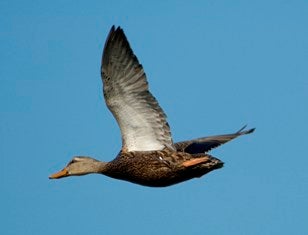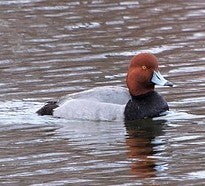
Most of the world's mottled duck (above) population lives along the Gulf Coast year round (Photo: Bill Stripling, courtesy of National Audubon Society) |
Luckily many duck species that spend the winter months along the Gulf Coast had already left the area when the Deepwater Horizon rig exploded. But one non-migratory species lives and breeds pretty darn close to the heart of the spill: the mottled duck
This species, a look-alike of the American black duck and often confused with the female mallard, winters and breeds along the Gulf Coast and is one of the few ducks that doesn’t move north, says bird expert Kenn Kaufman. Most of the mottled ducks in the world live along the edge of Louisiana and Texas, with smaller groups in Florida and as far south as Mexico. That makes them “especially vulnerable,” Kaufman says. “The mottled duck doesn’t have major populations elsewhere—only a small percentage of its population nests on the southern Great Plains and along the southern Atlantic coast.”
Also, we’re smack-dab in the middle of their breeding season. A typical mottled duck clutch can contain up to a dozen eggs, with a month-long incubation period that’s likely ending right about now—just as the oil is making its way toward the shore. The ducklings stick to the nest for just 24 hours after hatching, then head to the water behind mom to seek out food.
Mottled ducks typically feed in freshwater, not saltwater marshes. But no one really knows where the oil will end up, and according to Kaufman, these ducks sometimes move into areas where salt- and freshwater commingle. “They

Redhead (Photo by Shanth, Flickr Creative Commons) |
could easily pick up oil contamination there,” he says, adding, “If coastal marshes along the Gulf are extensively degraded, this species will definitely feel the effects.”
Sadly, that’s the short-term picture of oil and ducks. Though the spill may soon be plugged, its effects could endanger the region and these species for months, if not years. That means other ducks—the lesser scaup and the redhead, for example—may feel the heat when they return to the area next fall. “The redhead could be especially vulnerable if the oil contaminates the Texas coast,” Kaufman says, “since a high percentage of the world’s redhead population winters in the Laguna Madre of south Texas.”



